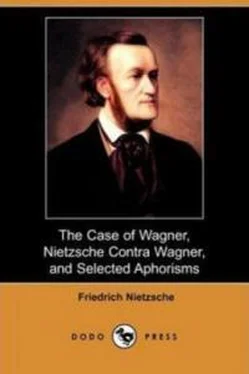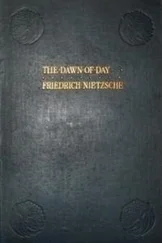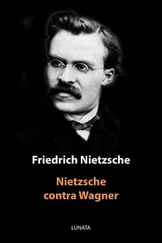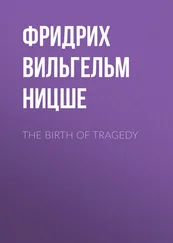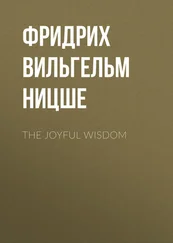The best instruction, the most conscientious schooling, the most thorough familiarity, yea, and even isolation, with the Old Masters,—all this only acts as a palliative, or, more strictly speaking, has but an illusory effect, because the first condition of the right thing is no longer in our bodies; whether this first condition be the strong race of a Handel or the overflowing animal spirits of a Rossini. Not everyone has the right to every teacher: and this holds good of whole epochs.—In itself it is not impossible that there are still remains of stronger natures, typical unadapted men, somewhere in Europe: from this quarter the advent of a somewhat belated form of beauty and perfection, even in music, might still be hoped for. But the most that we can expect to see are exceptional cases. From the rule, that corruption is paramount, that corruption is a fatality,—not even a God can save music.
And now let us take breath and withdraw a moment from this narrow world which necessarily must be narrow, because we have to make enquiries relative to the value of persons . A philosopher feels that he wants to wash his hands after he has concerned himself so long with the "Case of Wagner". I shall now give my notion of what is modern . According to the measure of energy of every age, there is also a standard that determines which virtues shall be allowed and which forbidden. The age either has the virtues of ascending life, in which case it resists the virtues of degeneration with all its deepest instincts. Or it is in itself an age of degeneration, in which case it requires the virtues of declining life,—in which case it hates everything that justifies itself, solely as being the outcome of a plenitude, or a superabundance of strength. Ãsthetic is inextricably bound up with these biological principles: there is decadent æsthetic, and classical æsthetic,—"beauty in itself" is just as much a chimera as any other kind of idealism.—Within the narrow sphere of the so–called moral values, no greater antithesis could be found than that of master–morality and the morality of Christian valuations: the latter having grown out of a thoroughly morbid soil. (—The gospels present us with the same physiological types, as do the novels of Dostoiewsky), the master–morality ("Roman," "pagan," "classical," "Renaissance"), on the other hand, being the symbolic speech of well–constitutedness, of ascending life, and of the Will to Power as a vital principle. Master–morality affirms just as instinctively as Christian morality denies ("God," "Beyond," "self–denial,"—all of them negations). The first reflects its plenitude upon things,—it transfigures, it embellishes, it rationalises the world,—the latter impoverishes, bleaches, mars the value of things; it suppresses the world. "World" is a Christian term of abuse. These antithetical forms in the optics of values, are both necessary: they are different points of view which cannot be circumvented either with arguments or counter–arguments. One cannot refute Christianity: it is impossible to refute a diseased eyesight. That people should have combated pessimism as if it had been a philosophy, was the very acme of learned stupidity. The concepts "true" and "untrue" do not seem to me to have any sense in optics.—That, alone, which has to be guarded against is the falsity, the instinctive duplicity which would fain regard this antithesis as no antithesis at all: just as Wagner did,—and his mastery in this kind of falseness was of no mean order. To cast side–long glances at master–morality, at noble morality (—Icelandic saga is perhaps the greatest documentary evidence of these values), and at the same time to have the opposite teaching, the "gospel of the lowly," the doctrine of the need of salvation, on one's lips!…Incidentally, I admire the modesty of Christians who go to Bayreuth. As for myself, I could not endure to hear the sound of certain words on Wagner's lips. There are some concepts which are too good for Bayreuth … What? Christianity adjusted for female Wagnerites, perhaps by female Wagnerites—for, in his latter days Wagner was thoroughly feminini generis —? Again I say, the Christians of to–day are too modest for me…. If Wagner were a Christian, then Liszt was perhaps a Father of the Church!—The need of salvation , the quintessence of all Christian needs, has nothing in common with such clowns; it is the most straightforward expression of decadence, it is the most convincing and most painful affirmation of decadence, in sublime symbols and practices. The Christian wishes to be rid of himself. Le moi est toujours haissable. Noble morality, master–morality, on the other hand, is rooted in a triumphant saying of yea to one's self ,—it is the self–affirmation and self–glorification of life; it also requires sublime symbols and practices; but only "because its heart is too full." The whole of beautiful art and of great art belongs here; their common essence is gratitude. But we must allow it a certain instinctive repugnance to décadents , and a scorn and horror of the latter's symbolism: such things almost prove it. The noble Romans considered Christianity as a foeda superstitio : let me call to your minds the feelings which the last German of noble taste—Goethe—had in regard to the cross. It is idle to look for more valuable, more necessary contrasts. [14] My "Genealogy of Morals" contains the best exposition of the antithesis " noble morality " and " Christian morality "; a more decisive turning point in the history of religious and moral science does not perhaps exist. This book, which is a touchstone by which I can discover who are my peers, rejoices in being accessible only to the most elevated and most severe minds: the others have not the ears to hear me. One must have one's passion in things, wherein no one has passion nowadays.
But the kind of falsity which is characteristic of the Bayreuthians is not exceptional to–day. We all know the hybrid concept of the Christian gentleman. This innocence in contradiction, this "clean conscience" in falsehood, is rather modern par excellence , with it modernity is almost defined. Biologically, modern man represents a contradiction of values , he sits between two stools, he says yea and nay in one breath. No wonder that it is precisely in our age that falseness itself became flesh and blood, and even genius! No wonder Wagner dwelt amongst us! It was not without reason that I called Wagner the Cagliostro of modernity…. But all of us, though we do not know it, involuntarily have values, words, formulæ, and morals in our bodies, which are quite antagonistic in their origin—regarded from a physiological standpoint, we are false …. How would a diagnosis of the modern soul begin? With a determined incision into this agglomeration of contradictory instincts, with the total suppression of its antagonistic values, with vivisection applied to its most instructive case. To philosophers the "Case of Wagner" is a windfall —this essay, as you observe, was inspired by gratitude.
Part 2
Nietzsche Contra Wagner
The Brief of a Psychologist
Preface
The following chapters have been selected from past works of mine, and not without care. Some of them date back as far as 1877. Here and there, of course, they will be found to have been made a little more intelligible, but above all, more brief. Read consecutively, they can leave no one in any doubt, either concerning myself, or concerning Wagner: we are antipodes. The reader will come to other conclusions, too, in his perusal of these pages: for instance, that this is an essay for psychologists and not for Germans…. I have my readers everywhere, in Vienna, St Petersburg, Copenhagen, Stockholm, Paris, and New York—but I have none in Europe's Flat–land—Germany…. And I might even have something to say to Italians whom I love just as much as I … Quousque tandem, Crispi … Triple alliance: a people can only conclude a mésalliance with the "Empire."…
Читать дальше
